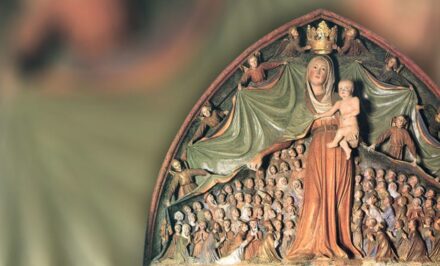
ARGENTINA, Father Javier Arteaga. We are already in the midst of the Jubilee Year of the Schoenstatt centenary, and as a Church we are journeying through Lent, a time of grace and conversion, on the road toward Easter.
![]()
“We begin the road toward Easter. Our pilgrimage is made more intense by contemplating, as of now, the Mystery that restored Life to us, the Mystery of our reconciliation with God through Jesus Christ, who suffered, died and rose for our sins. We prepare by walking, and all walk implies a departure, a going out. Like that of Abraham, like the one of the prophets, like that of any of those who one day, in Galilee, departed to follow Jesus.” (Cardinal Jorge Bergoglio, Lenten Message 2007).
Lent is a privileged time of inner pilgrimage toward Him who is the source of mercy. The pilgrimage speaks to us of a road that has a goal; it is not a walk without direction, herein lies one of the notes that defines the pilgrim’s time. The pilgrim knows where he/she is going, he/she goes, living in the hope of the joy that gives meaning to his life and walk. Keeping that search for God’s will alive, that desire for God is the source of holiness; it is a clear sign of the Spirit’s presence.
We do not go on pilgrimage alone
To begin this road that Lent proposes to us, we probably should speak about holiness, following Christ, as a call and a demand of our faith. The image of an athlete of which the apostle speaks and which the liturgy uses to show us the meaning and the necessity of the Lenten exercises, when he affirms: “Every athlete exercises discipline to win a perishable crown, but we an imperishable one. Thus I do not run aimlessly.” (cfr. 1 Cor. 9:24-29).
On this Lenten pilgrimage, which has following Christ at its center and strength, we do not go on pilgrimage alone, we go with our brothers/sisters with whom we live, who we love, appreciate or ignore; with whom we share our lives day to day. It is important to reflect on our personal attachments, what relationships we generate, if our living is an “indication toward heaven”. In this respect, the evangelist, Saint John, is clear when he affirms: “If anyone says, “I love God,” but hates his brother, he is a liar; for whoever does not love a brother whom he has seen cannot love God* whom he has not seen.j” (1 John 4: 20). Our faith cannot remain in an intimate dialogue with God; but rather, it should be the testimony of a living encounter with the God of mercy manifested in Jesus Christ, that generates fruitful attachments in the love with our brothers/sisters. This Lent, it is good to ask ourselves if we are willing to recognize our weaknesses and sins and to be aware of those attitudes that we should change in our life. There is no “inner pilgrimage” without an act of humility and contrition that allows us to recognize our weaknesses to make us willing to change. Our Lenten goal is the encounter with Christ our Lord, our Easter, and our Life.
A road of personal and communitarian renewal
In this year of 2014, we are also on pilgrimage toward October 18th as a Schoenstatt Family. On that day of the centenary of the Covenant of Love with Mary, we want to renew the Covenant of Love with Mary as a world-wide Movement, along with the Father and Founder and to place ourselves anew at her disposal to build the Kingdom of Christ with Her.
This pilgrimage is a road of personal and communitarian renewal, and for this, at the beginning of this Jubilee Year and within the framework of Lent it is good for us to ask for forgiveness.
– for the times that we were not loyal to the Covenant of Love sealed with Mary,
– for easily excusing ourselves of the words that we pledged in the Covenant,
– for not visiting Mary in the Shrine and for not helping her with her mission,
– for the failures against unity of the Family and of fraternity,
– for the failures of generosity and solidarity,
– for the egoistic ambitions and the power plays,
– for falsifying truth and justice,
– for the worldliness of our faith and of our love.
Let us fast based on concrete solidarity as a visible manifestation of Christ’s love in our life
During this time of Lenten pilgrimage, the Church proposes that we intensify our prayers, to perform merciful gestures and to fast.
“Let us fast from concrete solidarity as a visible manifestation of Christ’s love in our life. This way our fasting has meaning as a prophetic gesture and effective action…To fast is to love.” (Cardinal Bergoglio, Lenten Message 2011)
As I told you during another Lent:
– Fast from hurtful words and use kinder words.
– Fast from egoism and be more compassionate for those who are in most need.
– Fast from judging others and discover that Jesus lives in them.
– Fast from break-ups and build attachments.
– Fast from revenge and seek reconciliation and well-being.
– Fast from pessimism and place more trust in God.
– Fast from empty words and listen more to God and our brothers/sisters.
Dear brothers/sisters in the Covenant, may this 2014 Lent be a good time to renew ourselves in the Covenant of Love with Christ and Mary, and in do doing, to continue to go on pilgrimage and together build a Covenant Culture wherever we are.
Cordial greetings and blessings from the Shrine, Happy Covenant Day!
Father José Javier Arteaga
![]()
FatherJavier Arteaga is the National Director of the Schoenstatt Movement in Argentina, a participant of Conference 2014, and he belongs to the schoenstatt.org council
Original Spanish: Translation Celina M. Garza San Antonio, TX USA













